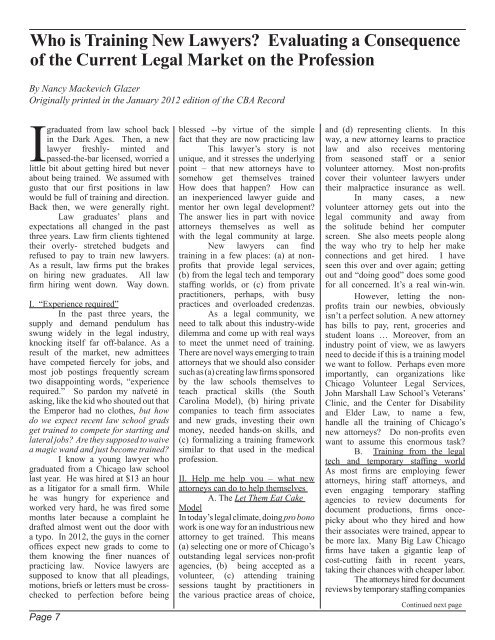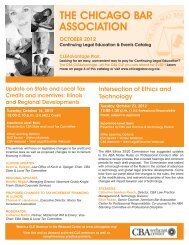ALLIANCE NEWS - The Chicago Bar Association
ALLIANCE NEWS - The Chicago Bar Association
ALLIANCE NEWS - The Chicago Bar Association
You also want an ePaper? Increase the reach of your titles
YUMPU automatically turns print PDFs into web optimized ePapers that Google loves.
Who is Training New Lawyers? Evaluating a Consequence<br />
of the Current Legal Market on the Profession<br />
By Nancy Mackevich Glazer<br />
Originally printed in the January 2012 edition of the CBA Record<br />
I<br />
graduated from law school back<br />
in the Dark Ages. <strong>The</strong>n, a new<br />
lawyer freshly- minted and<br />
passed-the-bar licensed, worried a<br />
little bit about getting hired but never<br />
about being trained. We assumed with<br />
gusto that our first positions in law<br />
would be full of training and direction.<br />
Back then, we were generally right.<br />
Law graduates’ plans and<br />
expectations all changed in the past<br />
three years. Law firm clients tightened<br />
their overly- stretched budgets and<br />
refused to pay to train new lawyers.<br />
As a result, law firms put the brakes<br />
on hiring new graduates. All law<br />
firm hiring went down. Way down.<br />
I. “Experience required”<br />
In the past three years, the<br />
supply and demand pendulum has<br />
swung widely in the legal industry,<br />
knocking itself far off-balance. As a<br />
result of the market, new admittees<br />
have competed fiercely for jobs, and<br />
most job postings frequently scream<br />
two disappointing words, “experience<br />
required.” So pardon my naïveté in<br />
asking, like the kid who shouted out that<br />
the Emperor had no clothes, but how<br />
do we expect recent law school grads<br />
get trained to compete for starting and<br />
lateral jobs? Are they supposed to waive<br />
a magic wand and just become trained?<br />
I know a young lawyer who<br />
graduated from a <strong>Chicago</strong> law school<br />
last year. He was hired at $13 an hour<br />
as a litigator for a small firm. While<br />
he was hungry for experience and<br />
worked very hard, he was fired some<br />
months later because a complaint he<br />
drafted almost went out the door with<br />
a typo. In 2012, the guys in the corner<br />
offices expect new grads to come to<br />
them knowing the finer nuances of<br />
practicing law. Novice lawyers are<br />
supposed to know that all pleadings,<br />
motions, briefs or letters must be crosschecked<br />
to perfection before being<br />
Page 7<br />
blessed --by virtue of the simple<br />
fact that they are now practicing law<br />
This lawyer’s story is not<br />
unique, and it stresses the underlying<br />
point – that new attorneys have to<br />
somehow get themselves trained<br />
How does that happen? How can<br />
an inexperienced lawyer guide and<br />
mentor her own legal development?<br />
<strong>The</strong> answer lies in part with novice<br />
attorneys themselves as well as<br />
with the legal community at large.<br />
New lawyers can find<br />
training in a few places: (a) at nonprofits<br />
that provide legal services,<br />
(b) from the legal tech and temporary<br />
staffing worlds, or (c) from private<br />
practitioners, perhaps, with busy<br />
practices and overloaded credenzas.<br />
As a legal community, we<br />
need to talk about this industry-wide<br />
dilemma and come up with real ways<br />
to meet the unmet need of training.<br />
<strong>The</strong>re are novel ways emerging to train<br />
attorneys that we should also consider<br />
such as (a) creating law firms sponsored<br />
by the law schools themselves to<br />
teach practical skills (the South<br />
Carolina Model), (b) hiring private<br />
companies to teach firm associates<br />
and new grads, investing their own<br />
money, needed hands-on skills, and<br />
(c) formalizing a training framework<br />
similar to that used in the medical<br />
profession.<br />
II. Help me help you – what new<br />
attorneys can do to help themselves<br />
A. <strong>The</strong> Let <strong>The</strong>m Eat Cake<br />
Model<br />
In today’s legal climate, doing pro bono<br />
work is one way for an industrious new<br />
attorney to get trained. This means<br />
(a) selecting one or more of <strong>Chicago</strong>’s<br />
outstanding legal services non-profit<br />
agencies, (b) being accepted as a<br />
volunteer, (c) attending training<br />
sessions taught by practitioners in<br />
the various practice areas of choice,<br />
and (d) representing clients. In this<br />
way, a new attorney learns to practice<br />
law and also receives mentoring<br />
from seasoned staff or a senior<br />
volunteer attorney. Most non-profits<br />
cover their volunteer lawyers under<br />
their malpractice insurance as well.<br />
In many cases, a new<br />
volunteer attorney gets out into the<br />
legal community and away from<br />
the solitude behind her computer<br />
screen. She also meets people along<br />
the way who try to help her make<br />
connections and get hired. I have<br />
seen this over and over again; getting<br />
out and “doing good” does some good<br />
for all concerned. It’s a real win-win.<br />
However, letting the nonprofits<br />
train our newbies, obviously<br />
isn’t a perfect solution. A new attorney<br />
has bills to pay, rent, groceries and<br />
student loans … Moreover, from an<br />
industry point of view, we as lawyers<br />
need to decide if this is a training model<br />
we want to follow. Perhaps even more<br />
importantly, can organizations like<br />
<strong>Chicago</strong> Volunteer Legal Services,<br />
John Marshall Law School’s Veterans’<br />
Clinic, and the Center for Disability<br />
and Elder Law, to name a few,<br />
handle all the training of <strong>Chicago</strong>’s<br />
new attorneys? Do non-profits even<br />
want to assume this enormous task?<br />
B. Training from the legal<br />
tech and temporary staffing world<br />
As most firms are employing fewer<br />
attorneys, hiring staff attorneys, and<br />
even engaging temporary staffing<br />
agencies to review documents for<br />
document productions, firms once-<br />
picky about who they hired and how<br />
their associates were trained, appear to<br />
be more lax. Many Big Law <strong>Chicago</strong><br />
firms have taken a gigantic leap of<br />
cost-cutting faith in recent years,<br />
taking their chances with cheaper labor.<br />
<strong>The</strong> attorneys hired for document<br />
reviews by temporary staffing companies<br />
Continued next page




